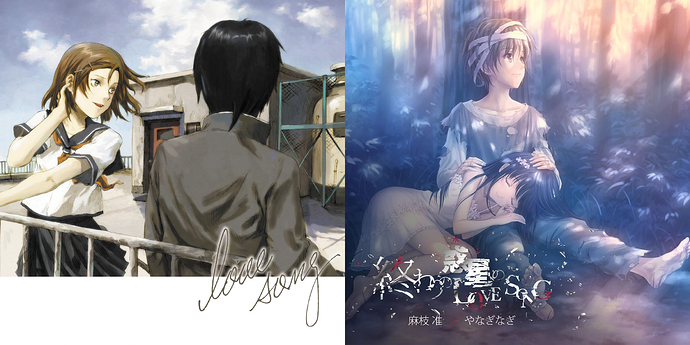Love Song Cover Art
The cover art features a boy and a girl on a windy rooftop, presumably a school one (as they appear to be in school uniforms), the girl looking at the boy and the boy facing away from us. Looking at the body language of the girl, she appears to be staring longingly at the boy. One hand is by her neck (brushing hair away maybe), something people are known to do when they are in love. Yet, her other arm is across her body, acting as a “barrier” between them. This hints that she is either bashful or has doubts about her love. As she is looking directly at the boy, I assume the latter. The boy is in a more casual position, one arm hanging over the rail. As we can’t see his face, he could be looking in any direction. This sense of anonymity tells us that his feelings are unknown.
The sky in the picture is grey and blue, but most notably dull. The rooftop they are on appears to be ruined, too. There notable damage along the wall near the door, and the railing seems to be somewhat rusted as well.
So, what does this have to do with the album?
Theory time
I believe the song is the girl and the boy’s journey to find love. In falling in love and breaking up, they go on a journey of self discovery. With each song metaphorically representing an event from their relationship, the album summarizes their love.
Hill of Beginning is the end of the first arc of the girl’s story. Because she is reflecting on her life, it starts here. She hints at how their relationship played out, and how she tried to move past it.
Azure Dream is denied her confession, and how she reels from it. Lines like “I knew eternity from you words” and “I will wait for our next encounter in the future” allude to this. But why did he?
Stone that becomes a Star is the lead up to her professing her love. In spring, she finds love. She decides to “live with confidence.” In summer, she confesses. She is rejected. In winter, she closes her heart to love. She begins her quest to find herself.
Run is a question: Was it fated to be? She realizes that fate does not control her, but she still believes that she could be with him
Hundred Year Summer is her acceptance. She realizes that time moves without her, and is thankful that she had met him.
Our Love is the start from the boy’s perspective. The boy learns that the girl is flawed in some way (maybe she was traumatized by something, or has Key Aids™). He wants to love her, but her flaw gets in the way. Deep down, he realizes that it was he who was at fault; he was unable to love. This is why he rejected her.
Grey Wings is both of their attempts to overcome adversity to find love. They share a common mental block, represented by the wall. They are connected, but still are stopped by something. The boy tries to love, but fails.
Gramophone depicts the boy’s attempt from Grey Wings to fall in love with the girl. Because the girl fell in love with him, he wanted to be like her (in love). Yet he fails, and is left again with only the thought of her to drive him.
Myth is the boy dying from his affliction. In not being able to love, life has no meaning. The dream the boy had of falling in love has “disappeared along with this world.”
Ice Clock is the where it sets in for the girl that the boy died. It’s the morning after, and she is finding the strength to move on. His death has her feeling frozen in time, trying to be optimistic about the future but still reminiscing about the past. She ultimately chooses to be with him
Unbreakable Wings represents their connection. The girl commits suicide, letting her be with the boy. She chased her dream: to be with him.
Thus the Story was Concluded is the end of the story from the girl’s perspective. All she wanted was to love, even though she was flawed in some way (painful life). She accepts love as eternity, and is ok as long as it’s with the boy. In the end, she was able to love.
Love Song is the end of the story from the boy’s perspective. He knows about both of their flaws, and knows how hard it is for them to be together. He is worried that it might not work out, but he wants it more than anything. He knows that if they work together, they can make each others’ dreams come true.
This made more sense in my head so feel free to point out any contradictions. I guess I see the album as “a representation of real, possible events” and don’t take too literally. At some point I might try to figure out the literal stuff too.

 )
)

